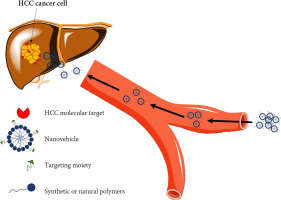Journal of Controlled Release ( IF 10.8 ) Pub Date : 2017-10-16 , DOI: 10.1016/j.jconrel.2017.10.027 Cristian Turato , Anna Balasso , Vinicio Carloni , Claudio Tiribelli , Francesca Mastrotto , Antonio Mazzocca , Patrizia Pontisso

|
Hepatocellular carcinoma, the most frequent solid tumor of the liver, has a very poor prognosis, being the second most common cause of death from cancer worldwide. The incidence and mortality of this liver tumor are increasing in most areas of the world as a consequence of aging and the emerging of new risk factors such as the metabolic syndrome, beside the recognized role of hepatitis B and C viral infections and alcohol abuse. Despite the increasing knowledge on the molecular mechanisms underlying hepatic carcinogenesis, effective therapeutic strategies are still an unmet clinical need. Efforts have been made to develop selective drugs as well as effective targeted drug delivery systems. The development of novel drug carriers for therapeutic molecules can indeed offer a valuable strategy to ameliorate the efficacy of HCC treatment. In this review, we discuss recent drug delivery strategies for HCC treatment based on the exploitation of targeted nanoparticles (NPs). Indeed, a few of these platforms have achieved an advanced stage of preclinical development. Here, we review the most promising drug nanovehicles based on both synthetic and natural polymers, including polysaccharides that have emerged for their biocompatibility and biodegradability. To maximize site-selectivity and therapeutic efficacy, drug delivery systems should be functionalized with ligands which can specifically recognize and bind targets expressed by HCC, namely cell membrane associated antigens, receptors or biotransporters. Cell surface and intracellular molecular targets are exploited either to selectively deliver drug-loaded nanovehicles or to design novel selective therapeutics. In conclusion, the combination of novel and safe drug delivery strategies based on site-specific targeted drug nanovehicles with therapeutic molecular targets may significantly improve the pharmacological efficacy for the treatment of HCC.
中文翻译:

肝细胞癌个性化治疗中功能化纳米药物递送系统的新分子靶标
肝细胞癌是肝脏中最常见的实体瘤,预后很差,是全世界第二大最常见的死因。由于衰老和新的危险因素(如代谢综合征)的出现,这种肝肿瘤的发生率和死亡率在世界上大多数地区都在增加,此外,乙型和丙型肝炎病毒感染和酗酒的作用也得到公认。尽管对肝癌发生的分子机制的了解越来越多,但有效的治疗策略仍是未满足的临床需求。已经努力开发选择性药物以及有效的靶向药物递送系统。用于治疗分子的新型药物载体的开发确实可以提供改善HCC治疗功效的有价值的策略。在这篇综述中,我们讨论了基于靶向纳米颗粒(NPs)的HCC治疗的最新药物递送策略。实际上,其中一些平台已达到临床前开发的高级阶段。在这里,我们综述了基于合成和天然聚合物的最有希望的药物纳米载体,包括因其生物相容性和生物降解性而出现的多糖。为了使位点选择性和治疗功效最大化,药物输送系统应使用能够特异性识别并结合HCC表达的靶标的配体进行功能化,即与细胞膜相关的抗原,受体或生物转运蛋白。利用细胞表面和细胞内分子靶标来选择性递送载有药物的纳米载体或设计新颖的选择性治疗剂。综上所述,


























 京公网安备 11010802027423号
京公网安备 11010802027423号